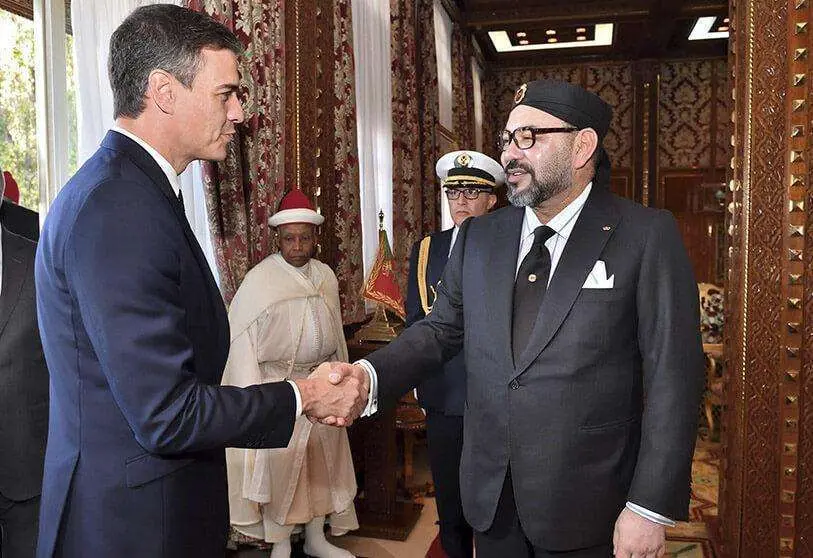Will there be reconciliation between Rabat and Madrid?

Spain's foreign minister, Arancha González Laya, has been dismissed from the Sánchez government with a dismal record in terms of diplomatic achievements. Instead, she has left a deep and unprecedented diplomatic crisis with the Kingdom of Morocco.
The foreign minister's departure, which is not known for sure whether it is due to the conflict unleashed by the reception of the fugitive Ghali or to a series of errors that Sánchez himself had consented to. What is certain is that this affair could have been the straw that broke the camel's back of a disastrous management of Spanish diplomacy. Moreover, the reshuffle of the Spanish government has left the Minister of Defence, the jurist who threatened the 'friendly and neighbouring' country in the midst of the diplomatic crisis, on the sidelines.
The only positive thing González Laya has done is to sign an advantageous Algerian gas contract. An action that is more in line with her speciality as a trade expert than as foreign minister, so the merit is also questionable, especially when this transaction has meant burying a strategic alliance with Morocco. The most important thing she should have resolved and did not do, as a trader, was to show her negotiating capacity to lift the tariffs with which Trump has punished Spanish products. But now in the Biden era, he has not been able to resume diplomatic relations with the new administration either, and his incompetence was finally reflected in the 29" in the corridor at the last NATO meeting.
In the case of the criminal Ghali, which, according to the ongoing judicial investigation, not only involves the foreign ministry, but also Margarita Robles' defence ministry, which acted as a facilitator of the clandestine entry of Morocco's number one enemy. Moreover, the former foreign minister continued to lie, provoking serious clashes with the Moroccan ambassador, Karima Benyaich. But it was the foreign minister himself, Nasser Bourita, who condemned her by discrediting her as an interlocutor.
The former minister made many serious mistakes that have placed her in the crosshairs of national and international criticism, damaging Spain's credibility in the eyes of the international community. Her departure from the Sánchez government had already been decided.
The decision to take in the criminal Ghali has broken all bridges. The most important one is that of trust, as this is the basis on which all other international relations are built, such as sincere dialogue on all issues of concern to both states, without red lines, anti-terrorist cooperation, immigration, concord, respect and good neighbourliness between neighbouring countries, etc.
Spain suffers from two evils, firstly that of arrogance towards its neighbour Morocco. Spain's political, economic, military and intellectual class, including the press, will have to do a mental exercise to rid itself of a centuries-old arrogance still based on anachronistic colonialist arrogance. And, secondly, Spain will have to regain control of its foreign policy from an EU that, due to its incoherence and the complexity of its structure, does nothing more than follow in the footsteps of the United States. A Spain that in recent years seems to have renounced its foreign policy and cooperation in the Mediterranean. An area that has now become a geopolitical battleground between the major powers and where Morocco stands out as the undisputed regional and continental leader.
As a geostrategic power, Morocco no longer admits the game of ambiguity in its international relations on a nuclear issue such as its Southern Provinces. The crisis unleashed with Morocco is more than a crisis, as it has brought all the conflicts to the surface, the consequences of which are still unnoticed. If González Laya has earned a seat on the board of directors of the Spanish gas lobby, the new Foreign Minister José Manuel Albares has the difficult task of restoring shattered diplomatic relations with Morocco. Indeed, reconciliation must involve making Spain's position on the Kingdom of Morocco's Southern Provinces transparent. In other words, Spain will have to rescue the scrolls of history that attest to the Moroccan ownership of a Sahara that Morocco has never ceased to claim and which took up arms against French colonialism, which seized part of the Eastern Sahara at the end of the 19th century, and against Spanish colonialism as early as 1958, when neither Algeria nor the Polisario mercenaries existed.
To clear up any ambiguity, Spain must abandon its false position based on an outdated Resolution that the UN Security Council itself has no longer considered for more than 20 years. In this sense, reconciliation should be based on Spain's recognition of the Kingdom of Morocco's full sovereignty over its Southern Provinces, accepting the Autonomy Plan proposed and widely accepted by the international community.

